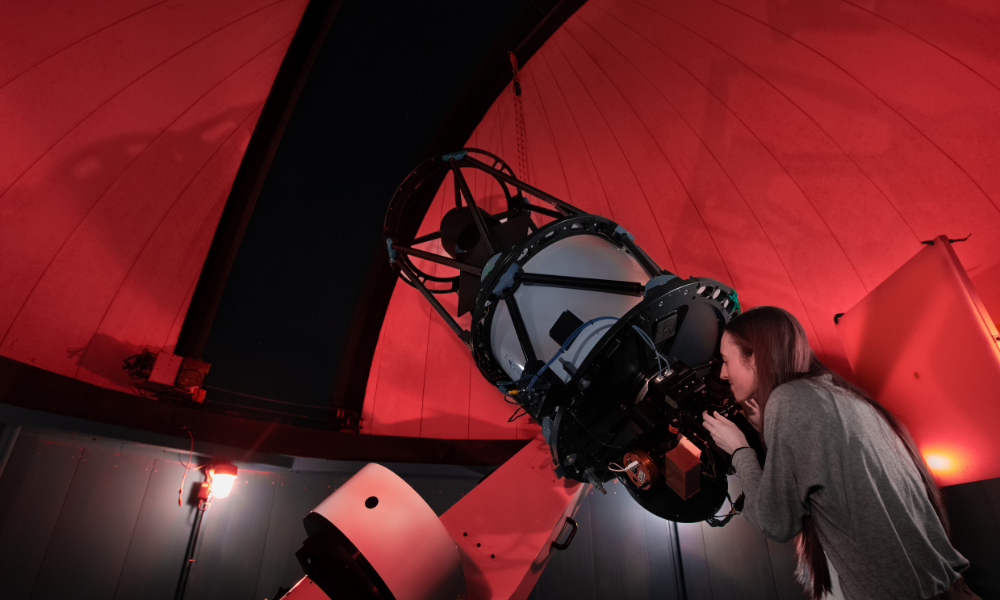Physics Program

Why study Physics?
Have you ever wondered what makes the Universe tick, what runs the world and where you come from? Physics is a science that deals with the origin and structure of matter in the universe, nature’s forces that govern how they interact, and the applications of physical phenomena in our everyday lives. Physicists study the matter at all length scales, from sub-atomic particles that make up everything around us to star-studded galaxies, to try and understand the fundamental laws and relationships that govern the known universe. Physics has profound uses in our society, including electricity, electronics, mechanics & motion of matter, lasers, imaging and therapy in medicine, and power generation.
The Saint Mary’s approach
The undergraduate program in physics provides a comprehensive breadth of knowledge in all the basic subjects of physics. This dynamic program features an interactive learning atmosphere.
Saint Mary’s faculty are leading nationally and internationally in research in subatomic physics. Undergraduate students get work exposure working at international scale large accelerator facilities.
Graduating with a BSc in Physics
Students studying physics gain knowledge to work at the forefront of academia and industry.
In addition to fundamental fields of physics research and development, physicists are in high demand in interdisciplinary fields like engineering, meteorology, nanotechnology, data science, remote sensing, computer development, geophysics, and health and medical technology.
According to the Canadian Association of Physicists, the employment rate for individuals with undergraduate physics degrees is 98%, and 99% for those with graduate degrees. A Bachelor of Science degree in Physics is also a gateway to advanced degree programs in physics, astronomy, engineering, chemistry, mathematics, medicine, and business administration (MBA).
Hands-on learning
Saint Mary’s Physics faculty members have received many awards and accolades from the international physics community for their research work. Many of our undergraduate students take part in this research through paid internships or assistantships. Students get the opportunity to work at particle accelerator centres in British Columbia, Germany, Japan and USA. Students can also choose to pursue further research projects through our honours degree program.
Sample courses offered:
- Classical Mechanics: Study the calculus of variations, constrained problems, and generalised Lagrangian and Hamiltonian dynamics. Applications are made to oscillations, the “brachistochrone problem”, central force problems, rigid bodies, and the motion of tops. Additional topics include relativistic mechanics, canonical perturbation theory, and chaos.
- Thermodynamics: You will be introduced to the basic ideas of thermal physics, including temperature, heat, work, entropy and free energy. These ideas are expanded into the first and second laws of thermodynamics, with applications including phase transitions, engines, refrigerators, and batteries.
- Experimental Physics: Develop the necessary skills to be a successful experimental (astro)physicist. Students assemble labs from advanced experimental equipment including computers and other digital devices, perform the experiment possibly over several weeks, and communicate their results in a scientifically useful fashion.
- Subatomic Physics: You will be introduced to modern nuclear and particle physics. Topics may include the nucleon-nucleon interaction, the deuteron, the nuclear shell model, dynamical probes of nuclei (electron, photon, and hadron scattering), the structure of nucleons and mesons, electroweak interactions.
Career opportunities (some examples):
- Physicist (Academia and industry)
- Medical physicist
- Data Scientist
- Computer programmer, Computational modelling
- Telecommunications engineering
- Electronics Industry
- Geophysicist
- Biophysicist
- Quantitative finance
- Computer-generated imagery (CGI) animator